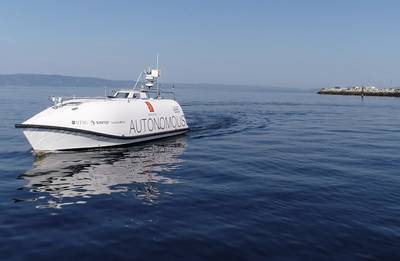New Roadmap for Smart and Autonomous Vessels
A new roadmap developed by leading maritime research institutes in Norway and Singapore examines the path ahead for smart and autonomous sea transport systems.
Unveiled at the SMI Forum in Singapore on October 22, by Senior Minister of State for Transport and Foreign Affairs, Chee Hong Tat, and the Ambassador of Norway to Singapore, Anita Nergaard, the roadmap has been developed by SINTEF Ocean in Norway and Technology Centre for Offshore and Marine, Singapore (TCOMS), with input from Singapore's Maritime and Port Authority (MPA) and Singapore Maritime Institute (SMI), as well as the Research Council of Norway (RCN).
The roadmap is a result of an MoU signed between SINTEF Ocean and TCOMS in June 2019. Singapore and Norway, as leading maritime nations, are in the forefront of developing and adopting new technology needed to keep a continuous and high focus on our research and development activities to stay ahead.
Smart ships provide the platform for a myriad of technologies to integrate and make our current transport systems more intelligent. Autonomous ships give the possibility to reimagine and reinvent our transport systems. Both are seen as necessary steps toward a future sustainable world-transport system.
The roadmap investigates the impacts of Industry 4.0 in the shipping sector in terms of smarter ships and ports, digital data exchanges, automated processes, autonomous ships and advanced robotics. The impacts are linked to ship physics and technical operations, and new work processes, business models and an innovation ecosystem are positioned into the emerging sea transport systems.
"International collaboration is essential to further develop, and to successfully implement, smart and autonomous systems, and we are pleased to establish a committed collaboration with TCOMS in Singapore in this area," says Dr. Vegar Johansen, president of SINTEF Ocean.
Another ambition is to establish an open and international innovation ecosystem supporting new business models and new market opportunities. Priority research areas are smart ship interaction, digital interoperability and smart ports. International standards are key elements in a level playing field.
"Smart and autonomous vessels will be a step-change for the maritime industry, but wide-spread deployment requires international standardization and agreements," says Ørnulf Rødseth, senior scientist at SINTEF Ocean and secretary of the International Network for Autonomous Ships.
The new agreement extends the existing MoU between Singapore (MPA) and Norway (RCN) on marine and maritime research and development. This shows the importance of autonomy in the maritime strategies of Singapore and Norway and reflects the ambition of the two nations to take a leading role in the development of the next generation of sustainable shipping.
"Largescale laboratories will be a crucial factor. Heavy-weather operations, complex maneuvering and intricate hardware systems are tested in a controlled environment, then in full scale," says prof. Chan Eng Soon of TCOMS and Øyvind Hellan of SINTEF Ocean in a common statement.

















